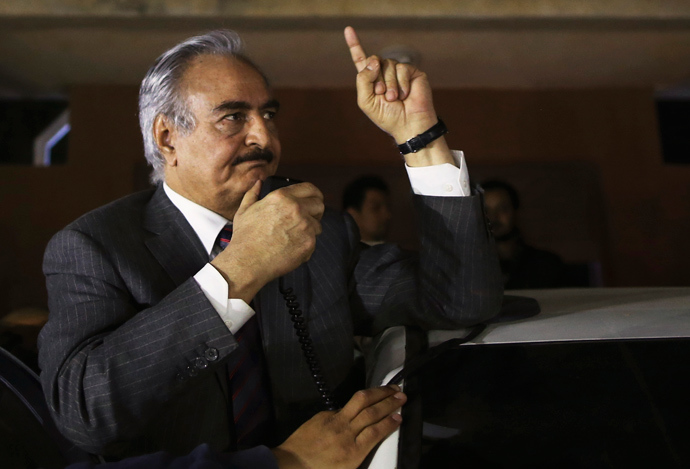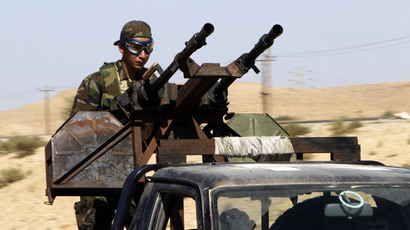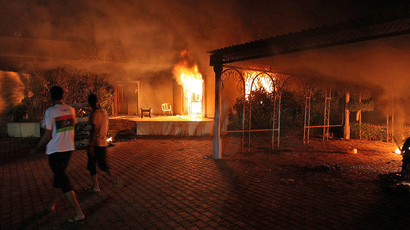43 killed in Libya clashes, authorities close Benghazi airport
Forty-three people were killed in Friday clashes between two militias and army troops loyal to a rogue general in Libya. The country’s authorities called the military offensive a “coup” and closed Benghazi's airport.
Military aircraft and helicopters fighting for General Khalifa Haftar were involved in the clashes and were spotted flying over Benghazi, Libyan security officials said, as quoted by AP.
The death toll from the clashes in the eastern Libyan city has risen to 43 from, up from the initially reported 19, a health ministry official said on Saturday, as cited by Reuters. Over 100 people were wounded.
"We have closed the airport for the safety of passengers as there were clashes in the city. The airport will be reopened depending on the security situation,” Reuters earlier quoted Ibrahim Farkash, director of Benghazi's Benina Airport, as saying.
Haftar's troops surrounded the bases of Islamist militia Rafallah al-Sahati and a militant group known as February 17, according to officials.
According to Haftar’s spokesman Mohammed al-Hegazi, some Libyan military units have joined the fight against the Islamist militias in an operation he called “Dignity of Libya.”
Meanwhile, the commander of the Rafallah al-Sahati brigade, Ismail al-Salabi, referred to the attack as a coup. Another commander, Fathi al-Obeidi, said Haftar's attack is "a rebellion against revolutionaries, the state and the legitimate revolt."
Libya's chief of staff, Maj. Gen. Abdel-Salam Gadallah al-Obeidi, said he will ban any military forces from entering Benghazi to join Haftar, AP reported. He described the unfolding events as a "coup."
Meanwhile, special forces spokesman Milad al-Zowi has denied that his troops were involved, LANA news agency reported.
In the wake of the recent unrest, Algeria has sent a team of special forces to evacuate its ambassador to Libya and embassy staff in a military plane after a militant threat to its embassy, Reuters reported, citing officials and a security source.
Robert Naiman from think-tank Just Foreign Policy told RT that these types of clashes could plunge Libya into a new civil war.
“It is already the case that one part of the military is apparently not following orders from the central government. It is already the case that the central government does not control the country...that there are rival centers of military power,” Naiman said. “Until now, the central government has been tolerated by these militias, but now apparently there is a faction of the government that wants to restore central control of the country. That is sure to provoke more fighting.”

Naiman also suggested that the troops attacking the militias might be making a power play in order to gain support from the West.
“We don’t know all the causes that are behind this, but it certainly is a striking confluence of events that the US military has announced that it positioned new forces in the region. It is also a striking confluence of events who is being attacked – militias in Benghazi. At the time when the Obama administration is under pressure to go after the groups that it judges responsible for the attack on the diplomatic mission in Benghazi,” Naiman said.
“With some people calling for new authorization of military force in Libya, which the Obama administration is resisting, it certainly would be convenient from the point of view of the Obama administration if some other group of people would go after militias in Benghazi. So it may be the case, I am speculating, that in part, this group that is attacking these militias is making a play for external support.”
Following the ouster of Colonel Muammar Gaddafi in 2011, militias expanded in numbers, filling in the gap while Libya struggled with weak military and police forces.
Just over a year ago, Libya lost US$1 billion due to a disruption in oil production. Violent incidents involving rival armed groups fighting over who gets to guard Libyan oil and gas facilities have become more frequent in post-Gaddafi Libya. Heavily armed militias have seized oil facilities, and local tribes have demanded revenue or jobs while blockading oil fields and sea terminals.
Haftar was an army commander under Gaddafi until the 1980s, when he defected. Following Gaddafi’s ouster, Haftar was appointed to rebuild the Libyan military, but was removed shortly after.
Meanwhile Libya's parliament remains split by rivalries, with little democratic reforms made since 2011. The country is now under the rule of its third prime minister since March, and a new constitution is still not ready.
On May 5, Libya's parliament confirmed Ahmed Maiteeq as the country's new prime minister. Deputy speaker Ezzedin al-Awami called the election invalid, but parliamentary president Nouri Abu Sahmain recognized the choice.
The new prime minister was elected after Abdullah al-Thinni resigned in April following an attack by gunmen on his family just one month into his term.
The prime minister before that, Ali Zeidan, escaped the country after being fired because he was not able to stop rebels from capturing oil fields.














